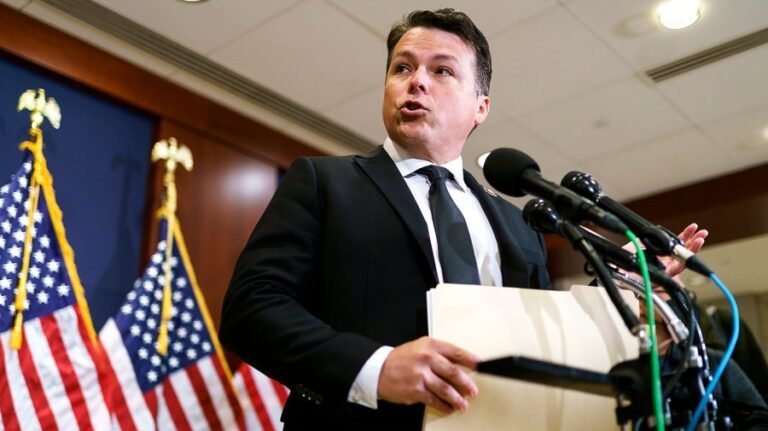
President Trump last week offered praise for the judiciary, touting his “GIANT WIN” before the Supreme Court. The conservative supermajority of six justices (three of whom he appointed) sharply limited the well-established practice of universal nationwide injunctions.
The high court was okay with lower court rulings temporarily freezing flagrantly unconstitutional executive actions that stripped the natural-born citizen plaintiffs who brought the case of their birthright. It refused, however, to extend the freeze to people similarly situated who were not parties to the litigation.
The “giant win” notwithstanding, Trump does not like judges — at least those judges who dare to get in his way. He has attacked judges’ integrity, sought their impeachment and cast aspersions on the ethnicity of individual jurists — all because they refused to rule in his favor.
Now, Trump has taken his derision of the courts to new depths. He is suing them, ignoring the venerable principle that judges are immune from suit for their official acts.
Trump’s beef is that Chief Judge George Russell III of the U.S. District Court in Maryland issued an “unlawful, antidemocratic” order in May that automatically grants a two-day stay of deportation to any detainee in immigration custody who files a petition for habeas corpus — an ancient proceeding testing the legality of a detention.
Russell’s sin is a standing administrative order, which applies not only to cases on his docket but also those before the 14 other district judges who sit in Maryland. The routine order reads as follows: “The recent influx of habeas petitions concerning alien detainees … that have been filed after normal court hours and on weekends and holidays has created scheduling difficulties and resulted in hurried and frustrating hearings in that obtaining clear and concrete information about the location and status of the petitioners is elusive.”
A two-day automatic stay to give a busy court a chance to turn around? Sounds innocuous enough. Scheduling orders are usually within the sound discretion of the district court. Not so, says Trump.
The case raises the threshold issue over which judicial officer will preside over this bizarre proceeding. The Maryland judges may all be conflicted, since it is an article of faith that “no one can sit in judgment on his own cause.” But Trump has not just sued Judge Russell, he has sued all the Maryland judges, so there is a rule of necessity that if all the judges are conflicted, none are conflicted. A good Maryland judge, or any district judge for that matter, could readily dispose of Trump’s case, dismissing it in short order. It doesn’t even pass the laugh test.
Trump has no respect for presidential norms. He is the first president to use the f-bomb on live television, telling reporters that Israel and Iran “have been fighting so long and so hard that they don’t know what the f— they’re doing.” He has created an attitudinal culture of executive fealty, where his satraps in the Justice Department feel comfortable in exhorting their colleagues in the profane epithet of their boss to ignore court orders and “f— the judges.”
Consider the testimony before the Senate Judiciary Committee of Emil Bove — Trump’s former criminal defense lawyer, now principal assistant deputy attorney general — whom Trump picked for a judgeship on the influential Third Circuit Court of Appeals. Bove sparred with Sen. Adam Schiff (D-Calif.) over allegations by a whistleblower that Bove told Justice Department lawyers that the agency may have to say “f— you” to a federal court to carry out the administration’s deportation agenda.
Bove, under oath, prevaricated, telling Schiff that he did not recall making such comments. Schiff, himself a former prosecutor, challenged Bove’s credibility: “If you said or suggested during a meeting with Justice Department lawyers that they should consider telling the court ‘f— you,’ it seems to me that would be something you’d remember.” You bet he would!
There is no known precedent for a government entity suing all the judges in a federal district. While the government might challenge a specific judicial decision by taking an appeal, suing an entire judicial cadre is an unprecedented unconstitutional action.
The roadblocks in Trump’s way are principles of independence and immunity. Under the Constitution, the judiciary is fashioned to be independent from the other branches of government to ensure fair and impartial rulings. And judges typically have broad immunity from lawsuits for actions taken in their official capacity, ensuring their ability to make difficult decisions without fear of retribution.
There are 15 active federal district judges sitting in Maryland, 13 of whom were appointed by Democratic presidents. They have ruled on a range of major cases this year, throttling key Trump initiatives. Trump is facing about 283 lawsuits nationally over his executive orders, and some of the most important litigation has occurred in Maryland.
Judge Paula Xinis presided over the case of Kilmar Abrego García. The White House dragged its feet over returning Abrego Garcia to the U.S. after he was wrongfully deported to El Salvador. Judge Stephanie Gallagher has a case involving the rights of unaccompanied minors who were sent to El Salvador when Trump invoked the Alien Enemies Act against alleged members of the Tren de Aragua gang. Democratic attorneys general filed a lawsuit before Judge James K. Bredar contending the administration illegally terminated probationary federal employees without warning local government officials in affected states. And Judge Brendan A. Hurson ruled that Trump’s executive orders on gender were illegally denying medical care to transgender youths.
Trump, who has exhibited a consistent antagonism to legal standards, ironically loves litigation. Litigation is transactional; there is a winner and a loser. For Trump, litigation is the quintessential tool of political warfare.
Trump historically has sued at the drop of a hat — he has sued for sport and to achieve a sense of control. He sued as a means of silencing or intimidating those who crossed him. He became a “plaintiff in chief,” the title of a book I wrote some five years ago about his litigious nature. Often, Trump would threaten to sue and not bring the case or sue to make a point and then drop the case. At the end of the day, he abused the process of the law.
Meanwhile, Trump has undermined the independence of the judiciary by intimidating the judges who have already feared impeachment — even violence — because of their decisions. Now, evidently with a certain relish, the plaintiff in chief has added to the mix a lawsuit targeting the judicial branch of government.
James D. Zirin, author and legal analyst, is a former federal prosecutor in New York’s Southern District. He is also the host of the public television talk show and podcast Conversations with Jim Zirin.

